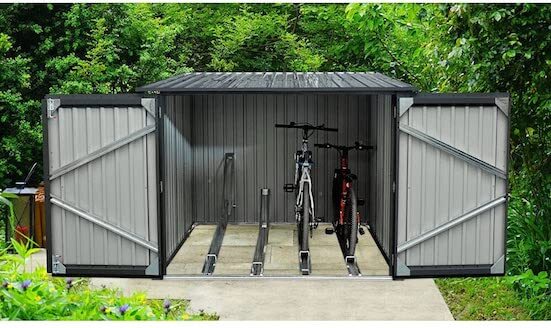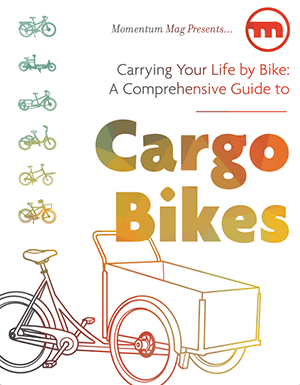It’s no secret that regular exercise is good for your health. Around 150 minutes of moderate exercise per week can boost energy, improve sleep patterns, increase resilience to disease, control weight, and have a significant positive impact on a person’s mental health and overall mood.
When many people consider the health impacts of cycling, they think of the sport-oriented form of cycling that involves long-distance, fast rides and lycra, or at the very least a pair of sneakers and a workout shirt. Casual commuter cycling is better for you than sitting in a car or on the bus, sure, but it can’t be that much better, can it?
A recent study undertaken at Brunel University in London, England, found that English people who regularly commute by bike are four times more likely than other commuters to get the 150 minutes of moderate exercise per week recommended by the World Health Organization. With its focus narrowed to London rather than nationwide, bike commuters were six times more likely to meet the recommended activity guidelines.
Despite wide public acknowledgement of the innumerable benefits of exercise, rates of regular physical activity among adults worldwide still remains staggeringly low. An international survey of 122 countries using three definitions of physical activity estimated that a full 31.1% of adults (aged 15+) are physically inactive. Rates of inactivity are highest in the Americas and the eastern Mediterranean, and tend to increase along with a country’s GDP. Inactivity also increases with age, and is more common in women than men.
While the reasons many adults abstain for exercise are manifold, what is clear is that much more needs to be done at a policy level to encourage physical activity. While the government cannot force its residents to join a gym or a soccer team, they can certainly build the infrastructure that enables people to incorporate activity into their current schedule.
“People are often put off by the thought of being active for 150 minutes a week,” study lead Glenn Stewart told the Standard. “But if this is made part of getting around, it almost becomes hard not to meet the guidelines.”
Stewart’s research provides impetus for greater investment in safe cycling infrastructure and promotion of commuter cycling as a simple, cost-effective solution to a what is becoming a significant public heath issue. “We get stories about the National Health Service (NHS) being financially overburdened every week,” Stewart explained. “Seventy per cent of the NHS budget is spent on long-term conditions and 20 to 40 per cent of all long term conditions can be reduced or ameliorated by physical activity. So physical activity is a very good thing. Cycling and active transportation are very good things.”
While Stewart’s research was limited to England, his findings corroborate a 2011 study undertaken by Thomas Götschi at the University of Zurich. Götsch undertook a comprehensive cost-benefit analysis of investment in bicycling in Portland, OR. He determined that, by 2040, investments in the range of $138 to $605 million will result in health care savings of $388 to $594 million (…) and savings in value of statistical lives of $7 to $12 billion.
Stewart also cast aside any notion that potential risks caused by cycling outweighed the potential benefits of the exercise. “Yes, there are risks in terms of collisions and exposure to pollution, but those things statistically are very, very small in comparison with the health benefits that you get from cycling,” adding, “The evidence on pollution is you’re much better off cycling than being in a car.”
As nations worldwide grapple with the obesity epidemic, rapidly rising rates of diabetes and cardiovascular diseases, skyrocketing rates of mental health issues, and the 3500 people killed in traffic crashes every day, encouraging regular cycling seems like the least complicated way to begin addressing some very complicated issues.
Get your FREE copy of our guide: Momentum Mag's Cargo Bike Guide
Discover the wonderful world of cargo bikes! Download this comprehensive guide to learn about different cargo bike models, brands, the history of cargo bikes, buying advice, one family's experience with cargo biking, and more.
Thank you for your submission. Please check your inbox to download the guide!
Hilary Angus is the Online Editor at Momentum Mag. @HilaryAngus



















This isn’t exactly news “Cycling towards Health and Safety” (Mayer Hillman, 1992) found that the benefits of cycling outweighed the risks by 20:1 and regular cyclists lived two years longer than average and suffered less from all forms of illness. Welcome nonetheless, and if the message that cycling is safe and healthy eventually reaches the media, especially the BBC, they might even report it. But since the BBC have just had a series of items about pollution from motor vehicles without once mentioning Active Travel, cycling and walking, I’m fairly safe in predicting that they will start ignoring this report immediately, just like the many other reports about cycling they’ve ignored over the years.
Para 5: abstain from, not abstain for.
And if riding one of the bikes shown is uncomfortable for you, check out the world of recumbents!
Hilary, six times more likely to meet recommended activity guidelines does not mean six times healthier. Thanks for writing this article but please check your facts.
True Amanda, the study cites “30% reduction in all-cause mortality [and] 20–40% in many long-term conditions.” Also, the study generally concluded a 4x benefit with regard to meeting targets, with the 6x figure only applying to one group. So regular bicycle commuting probably gives us 4x better odds of being 30% less likely to die early. These articles do require a careful reading, but I am very grateful that Hilary brought it to our attention!
Comments are closed.